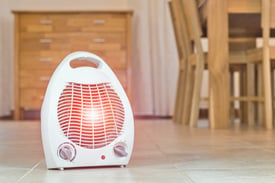
It’s December – and December and January are the peak months for home fires.
During the winter, everyone uses furnaces, space heaters and more to keep their home warm and cozy. These shifts are of course necessary, but they can also come with fire safety concerns.
The threat of house fires from heating elements in the winter is very real. According to the National Fire Protection Association (NFPA), heating equipment caused one in six home fires that took place from 2016-2020, and accounted for 18% of home fire deaths. The vast majority of home heating fire deaths – 88% - involved space heaters.
Those numbers can be scary, but there are many things you can do to protect yourself and your loved ones this winter. In this blog, we’ll share some things you can do to make sure your family not only stays warm, but also fire safe.
Stay up to date on maintenance & cleaning
If you’re a homeowner, you know the maintenance to-dos can feel endless – but one you never want to skip is an annual inspection of your HVAC system.
During an inspection, a trained professional will look at your heating and cooling units inside and outside the home to ensure that everything is working properly and nothing needs replaced. Not only will this keep you safe – it also can help save you money on heating and cooling costs, since your system will be working as efficiently as possible.
Between inspections, make sure you also replace filters throughout your heating and cooling units. Clogged or dirty filters can quickly fuel fires. Check your manual to see how frequently filters need to be changed, and don’t forget to also clean your air ducts. Air ducts should be cleaned every 3 to 5 years by a professional.
One aspect not to overlook when cleaning? Your fireplace. According to the NFPA, the leading factor contributing to home heating fires was failure to adequately clean out various elements – especially chimneys. Chimneys should be cleaned once a year.
Make sure heating equipment is spaced correctly
If your home gets especially cold in the winter, you might turn to a space heater to keep everyone comfortable. Space heaters are a good option to heat up a small room or especially drafty area, but special precautions must be taken – 88% of home heating fire deaths are caused by space heaters.
Precautions should include:
- Keep all space heaters on the floor – don’t elevate them in any way.
- Keep space heaters away from water or possible drips.
- Follow the three-foot rule – keep anything flammable at least three feet away in all directions from a space heater. This could include curtains, papers, clothing, furniture and more.
- Keep children at least three feet away from a space heater at all times.
- Plug a space heater into the wall, not an extension cord or power strip.
- Never leave a space heater unattended.
Keep in mind: the three-foot rule also applies to other heating elements, such as a furnace or fireplace. You don’t want a space heater within three feet of another heating element.
Other prevention tips
No one wants to think about a fire happening in their home, but the best thing you can do is be prepared. In the winter when fires are most likely to happen, you want to be absolutely sure that you have working smoke detectors.
Smoke alarms should be installed in each bedroom or sleeping area, and on every floor of the home. Ideally, you’ll have interconnected smoke alarms so that if one goes off – they all go off. Smoke alarms should be replaced when they are 10 years old and tested monthly if possible. Also make sure your home has a carbon monoxide detector on every floor, including your basement. Ideally, place one outside every bedroom.
Additionally, make sure your family has a fire escape plan and knows what to do in case of an emergency. All family members should know two ways out of each room in the house, and they should know where to meet-up away from the home in the case of an evacuation. If your family has small children or anyone who may not be able to escape on their own, make sure someone is assigned to assist them in case of emergency.
Home fires are a scary thought, but being prepared can help ease the anxiety. Our blog is full of more fire and life safety tips to explore, and when in doubt – call in a professional. We’d love to help with your custom fire and life safety needs.

